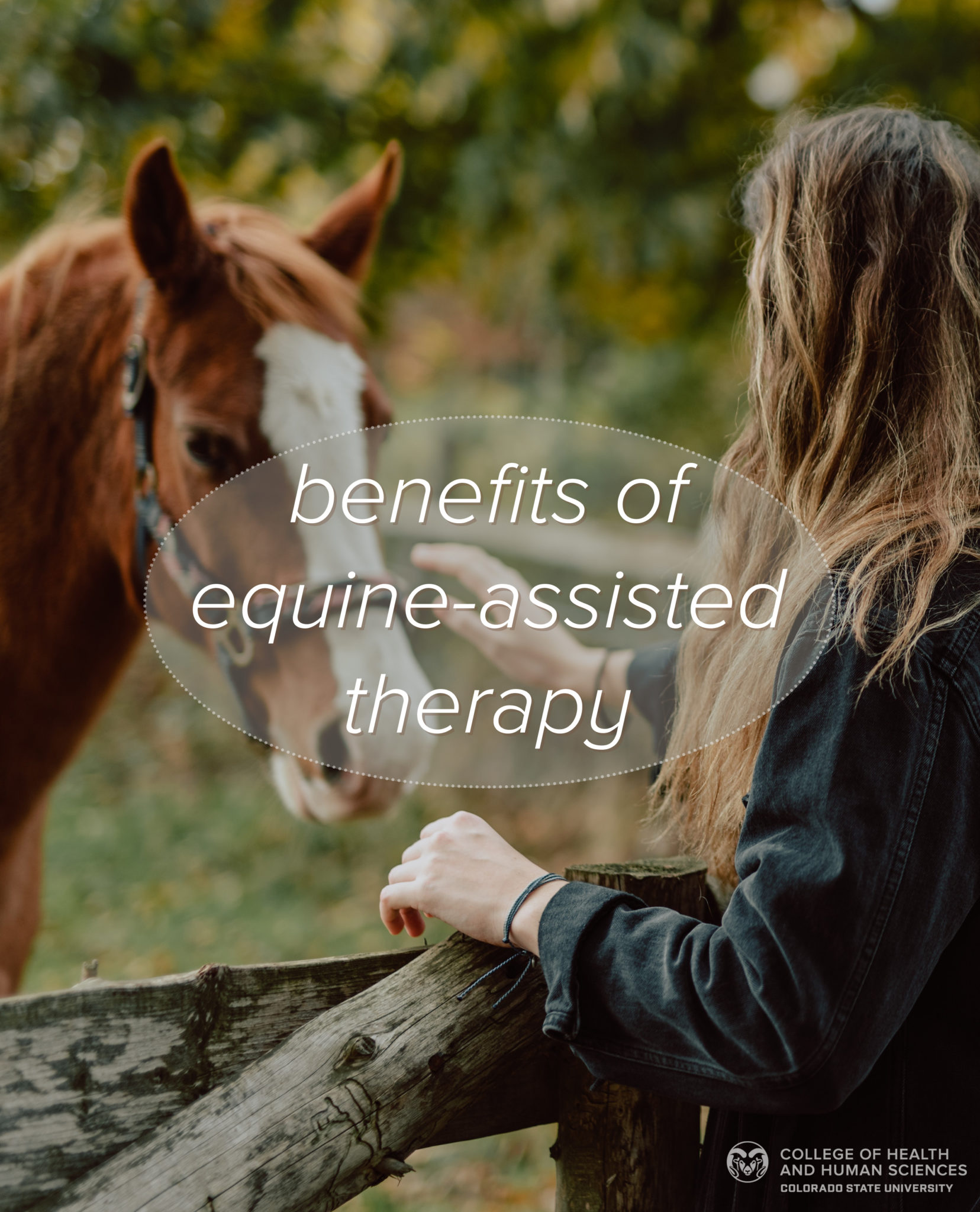By Elizabeth Poulin
As you enter 2019, you may be asking yourself ‘what do I want to do differently this year?’ Resolutions or not, we often benefit from taking care of ourselves and trying new things. A form of effective self-care is interacting with and caring for animals. I want to encourage you to consider spending time with horses in the New Year.
As an abundance of research has shown, animal-assisted therapy is effective at helping to treat people of all ages and abilities who suffer from mental and/or physical illness (Barker & Dawson, 1998; Martin & Farnum, 2002; Morrison, 2007). Animal assistance, or “aids,” have shown to increase mental wellbeing when paired with psychotherapy (Morrison, 2007). One emerging subset of animal therapy is hippotherapy, or equine-assisted therapy.
What is equine-assisted therapy?

Equine therapy is an experiential therapy that involves interactions between individuals and horses. These interactions include, but are not limited to, grooming, feeding, leading, and riding. Equine therapy in conjunction with physical therapy and psychotherapy helps individuals with a variety of physical and mental disabilities. Specific groups of individuals who have benefited from equine-assisted therapy are at-risk youth.
So what factors go into determining who is at-risk how does equine-assisted therapy help these youth? Factors that are accounted for when determining an at-risk youth include, but are not limited to, emotional and behavioral difficulties, family discord, maltreatment, low socio-economic status, and academic difficulties (Wilkie, Germain, & Theule, 2016). Research has shown that, compared to other animal-assisted or no animal-assisted therapy, at-risk youth who had equine-assisted therapy in addition to psychotherapy had higher rated of self-control and, upon follow-up, had fewer arrests and had less drug use (Hoagwood, Acri, Morrissey, & Peth-Pierce, 2017).
Benefits of equine-assisted therapy
Wilkie, Germain, and Theule (2016) believe that these positive effects are due to the animal acting as a buffer between youth and therapist, easing tensions and thus allowing for a faster, easier connection between therapist and client. This effect can especially be helpful when helping victims of trauma. Specifically, horses provide the experience of positive touch (between horse and client) and boundaries that help lay the foundation of self-regulation for youth that have experienced trauma (Wilkie, Germain, & Theule, 2016).
Further, we see the benefits of equine-assisted therapy for adults and families. The benefits include increased self-regulation, decreased stress, and increased communication between family members. These benefits further highlight the positive impact horses can have.
This is a just a small glimpse into the benefits of equine-assisted therapy. However, as research grows in this area, we will gather a better and more inclusive understanding of how equine therapy can help not just at-risk youth, but the rest of us as well. It is also important to remember that all of the research that has shown positive effects of equine therapy have been paired with psychotherapy. That is to say, exposure to horses outside of the therapy context has not been shown to have the same benefits.
So, please consider what the combination of equine-assisted therapy and psychotherapy could provide you and/or your family in 2019. For additional information, please contact the CSU Center for Family and Couple Therapy at (970) 491-5991. Here’s to an exciting New Year!
Elizabeth “Libby” Poulin is a University of Houston graduate from Houston, Texas, and a second-year student in the Marriage and Family Therapy Program at CSU. She got her Bachelor of Science in psychology with a minor in anthropology. Libby is interested in becoming a sex and couples therapist with a specialization in the LGBTQ community. She has experience working as a residential counselor at the Houston OCD program and as an intern at Houston Relationship Therapy. Her hobbies include horseback riding, being with her Jack Russell Terrier (Pippa), and being with her human (her husband).
Colorado State University’s Center for Family and Couple Therapy is affiliated with the MFT Program and provides high-quality therapy services to families, couples, individuals, adolescents, and children. The CFCT offers services to all members of the Larimer County community, as well as to students, faculty, and staff on campus. For more information, see the Center for Family and Couple Therapy website.
For more health tips, visit the College of Health and Human Sciences Pinterest board.